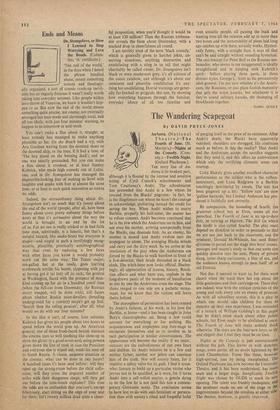Ends and Means
Dr. Strangelove, or How
I Learned to Stop Worrying and Love the Bomb. (Colum- bia; 'A' certificate.)
`THE end of the world,' in the days when I heard the phrase bandied about, meant something remote and theologic- ally organised, a sort of cosmic crash-up inevit- able but so vaguely forecast it wasn't really worth taking into everyday account. Like people within lava-throw of Vesuvius, we knew it wouldn't hap- pen to us. But now the end of the world means something quite precise, not cosmic, not externally arranged but man-made and alarmingly local, and all too likely, with just four minutes' warning, to happen to us tomorrow or next week.
You can't make a film about it, straight; at least nobody has managed to make anything plausible so far. On the Beach had a try, with Ava Gardner waving from the doomed shore to the doomed ship, to the tune, if it had a tune, of 'The boy stood on the burning deck'; and no one was exactly persuaded. But you can make a film about it crooked; or at least Stanley Kubrick, who made high comedy out of Lolita, can, and in Dr. Strangelove has managed the impossible-looking feat of making us howl with laughter and quake with fear at almost the same time, or at least in such quick succession as makes no odds.
Indeed, the extraordinary thing about Dr. Strangelove isn't so much that it's funny about the end of the world (people, after all, have been funny about some pretty unfunny things before now) as that its persuasive about the way the world is brought to an end by the lot of us. For no one is really wicked or in bad faith (one man, admittedly, is a lunatic, but that's a natural hazard, like snake-bites) but everyone is stupid—and stupid in such a terrifyingly recog- nisable, plausible, practically autobiographical way that even by replacing a few faces with other faces you know it would probably work out the same way. The Texan major, ten-gallon hat at the ready, goes hurtling earthwards astride his bomb, yippeeing with joy at having got it (at last) off its rack; the general in Washington, faced with the prospect of man- kind coming up for air in a hundred years' time (when the fall-out from Doomsday, the Russian secret weapon, will be done with), still fusses about whether Ruskie mine-dwellers (breeding underground for a century) mayn't get up first. 'Search then the ruling passion'; after all, what would we do with our four minutes?
In the film it isn't, of course, four minutes. Kubrick has given his people about two hours to spend before the world goes up. An American general, one of those fresh-faced boyish maniacs the cinema uses so well (nothing like close-up to show the glitter in a good-scout eye), using powers given down the line of rank in case the President and everyone else is wiped out, sends his men off to bomb Russia. A classic suspense situation in the cinema: what can be done in two hours? A hundred times it's been used before: will they open up the strong-room before the child suffo- cates, will they cross the required number of miles with their dangerous cargo, will they get out before the time-bomb explodes? This time the odds are so outlandish that you can't, except hilariously, start sitting on the edge of your seat for them. Isn't twenty million dead quite a cheer-
ful proposition, when you'd thought it would be at least 120 million? Then the Russian ambassa- dor reveals the facts about Doomsday, with a marked drop in cheerfulness all round.
I am terribly tired of the term 'black comedy,' which is generally given to hatchet jokes, un- nerving situations, anything destructive and annihilating with a sting in its tail that might charitably be called comic. Dr. Strangelove isn't black or even mushroom grey, it's all colours of the comic rainbow, and although it's about our imminent and plausible annihilation it's any- thing but annihilating. Horrid warnings are gener- ally far-fetched or priggish; this one, by showing how everything happens through the familiar, everyday idiocy of all too familiar and even amiable people, all passing the buck and wasting time till the minutes add up to more than two hours and the inexorability of plans laid long ago catches up with them, actually works. Hysteri- cally funny, with a straight face, it says all that can't be said straight without sounding hysterical. The cast (except for Peter Bull as the Russian am- bassador, who seems to me exaggerated) is ideally straightfaced and in keeping with Kubrick's spirit: Sellers playing three parts, in three distinct styles, George C. Scott as the persuasively idiot general. I'm not sure whether it's the Ameri- cans, the Russians, or just plain foolish humanity that gets the worst knocks, but whichever it is they're sound salutary knocks, the thumping of blockheads together.
ISABEL QUIGLY






































 Previous page
Previous page